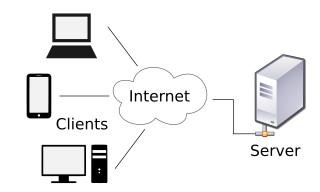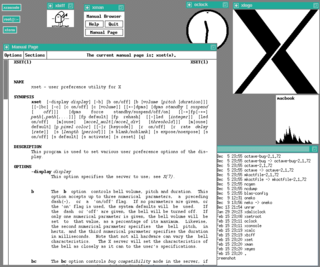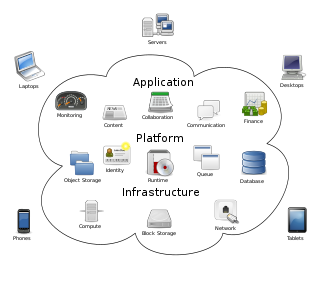Remote computing may refer to:
Remote computing may refer to:
In distributed computing, a remote procedure call (RPC) is when a computer program causes a procedure (subroutine) to execute in a different address space, which is coded as if it were a normal (local) procedure call, without the programmer explicitly coding the details for the remote interaction. That is, the programmer writes essentially the same code whether the subroutine is local to the executing program, or remote. This is a form of client–server interaction, typically implemented via a request–response message-passing system. In the object-oriented programming paradigm, RPCs are represented by remote method invocation (RMI). The RPC model implies a level of location transparency, namely that calling procedures are largely the same whether they are local or remote, but usually, they are not identical, so local calls can be distinguished from remote calls. Remote calls are usually orders of magnitude slower and less reliable than local calls, so distinguishing them is important.
Shell may refer to:
Trusted Computing (TC) is a technology developed and promoted by the Trusted Computing Group. The term is taken from the field of trusted systems and has a specialized meaning that is distinct from the field of Confidential Computing. The core idea of trusted computing is to give hardware manufacturers control over what software does and does not run on a system by refusing to run unsigned software. With Trusted Computing, the computer will consistently behave in expected ways, and those behaviors will be enforced by computer hardware and software. Enforcing this behavior is achieved by loading the hardware with a unique encryption key that is inaccessible to the rest of the system and the owner.
Client(s) or The Client may refer to:

A Beowulf cluster is a computer cluster of what are normally identical, commodity-grade computers networked into a small local area network with libraries and programs installed which allow processing to be shared among them. The result is a high-performance parallel computing cluster from inexpensive personal computer hardware.
RPC may refer to:
A virtual private network (VPN) extends a private network across a public network and enables users to send and receive data across shared or public networks as if their computing devices were directly connected to the private network. The benefits of a VPN include increases in functionality, security, and management of the private network. It provides access to resources that are inaccessible on the public network and is typically used for remote workers. Encryption is common, although not an inherent part of a VPN connection.

In computer science, inter-process communication or interprocess communication (IPC) refers specifically to the mechanisms an operating system provides to allow the processes to manage shared data. Typically, applications can use IPC, categorized as clients and servers, where the client requests data and the server responds to client requests. Many applications are both clients and servers, as commonly seen in distributed computing.
A desktop traditionally refers to:

Virtual Network Computing (VNC) is a graphical desktop-sharing system that uses the Remote Frame Buffer protocol (RFB) to remotely control another computer. It transmits the keyboard and mouse input from one computer to another, relaying the graphical-screen updates, over a network.
Leeching may refer to:

In computing, a client is a piece of computer hardware or software that accesses a service made available by a server as part of the client–server model of computer networks. The server is often on another computer system, in which case the client accesses the service by way of a network.

In computing, a shell is a computer program that exposes an operating system's services to a human user or other programs. In general, operating system shells use either a command-line interface (CLI) or graphical user interface (GUI), depending on a computer's role and particular operation. It is named a shell because it is the outermost layer around the operating system.
Digital fingerprint may refer to:

In computing, the term remote desktop refers to a software- or operating system feature that allows a personal computer's desktop environment to be run remotely off of one system, while being displayed on a separate client device. Remote desktop applications have varying features. Some allow attaching to an existing user's session and "remote controlling", either displaying the remote control session or blanking the screen. Taking over a desktop remotely is a form of remote administration.
Colocation or collocation may refer to:

Cloud computing is the on-demand availability of computer system resources, especially data storage and computing power, without direct active management by the user. Large clouds often have functions distributed over multiple locations, each of which is a data center. Cloud computing relies on sharing of resources to achieve coherence and typically uses a "pay as you go" model, which can help in reducing capital expenses but may also lead to unexpected operating expenses for users.

Teradici Corporation was a privately held software company founded in 2004, which was acquired by HP Inc. in October 2021. Teradici initially developed a protocol (PCoIP) for compressing and decompressing images and sound when remotely accessing blade servers, and implemented it in hardware. This technology was later expanded to thin clients/zero clients for general Virtual Desktop Infrastructure. Teradici's protocol or hardware is used by HP, Dell-Wyse, Amulet Hotkey, Samsung, Amazon Web Services, Fujitsu, and VMware.
FIFO may refer to: